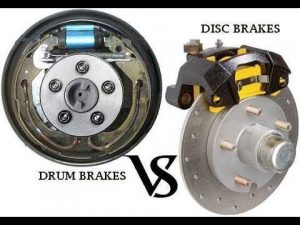Here’s the latest reader question, along with my reply!
Meg asks: This is a “girl” question, so forgive me – but why are disc brakes better than drum brakes? What’s the difference?
My Reply: They aren’t necessarily better! It depends on the criteria.
Disc brakes dissipate heat better and (usually) have more surface area, so they have more resistance to fade under heavy braking and offer better overall braking performance. Plus, they’re simpler – in general – and easier to maintain. There is a disc, caliper – the thing which squeezes the caliper, to apply braking force – the pads inside the caliper and not many small parts.
But…
Drum brakes are much more rugged and usually last longer, especially the drum (equivalent to the caliper) which is reusable several times (it can be machined, or “turned” during a brake job) while the rotors used in many newer cars are made of comparatively thin/comparatively fragile steel that is more easily damaged (e.g., “warpage” due to heat, overtorqued lug nuts – a common problem – and inept brake service) and frequently have to be replaced to be repaired. This can get expensive.
Same with regard to the calipers in a disc bake system. These are expensive to replace when they fail; in a drum system, there is no caliper – wheel cylinders perform the function of the caliper in a disc system – and wheel cylinders are more durable and much cheaper to rebuild/replace when needed.
In my opinion, it is debatable whether disc brakes are that much of a real-world advantage in a street-driven car. On the track – or in a high-performance car driven fast on the street, discs win hands down. This is why discs are so common – the test performed on the track tout the superior performance of discs … but much of that is just talking points, like the 130 MPH “sustained safe speed” rating some performance tires tout. How often do you sustain speeds of 130 MPH? Or even 90?
The truth is almost all new cars are overbuilt in terms of their capabilities – relative to the way almost all people actually drive and in the context of what the law allows as regards driving.
In my opinion, some of this overbuilding – ABS is a good example – has encouraged poor driving by giving people the idea that they can afford to be less careful and so do things like tailgate and fail to pay full time and attention to the road.
If we were allowed to drive at even two-thirds the pace that modern cars would easily allow safely – assuming competent drivers – then discs all around (and 130 MPH tires) make absolute sound sense.
But in the real world, as it is? I dunno!
…
Got a question about cars – or anything else? Click on the “ask Eric” link and send ’em in!
If you like what you’ve found here please consider supporting EPautos.
We depend on you to keep the wheels turning!
Our donate button is here.
If you prefer not to use PayPal, our mailing address is:
EPautos
721 Hummingbird Lane SE
Copper Hill, VA 24079
PS: Get an EPautos magnet (pictured below) in return for a $20 or more one-time donation or a $10 or more monthly recurring donation. (Please be sure to tell us you want a sticker – and also, provide an address, so we know where to mail the thing!)
My latest eBook is also available for your favorite price – free! Click here. 












Having a four wheel drum car I would go with disc every time or at least front disc.
I’ve had the drums fade in street use. Then there is the pulling that will manifest if the brake system is not diligently kept up.
Also in this era of weight savings drums are not made to be machined either.
I was riding with a friend once years ago who was driving an early 1960s Dodge, of course equipped with drum brakes. After running through a deep puddle he had to drive through a red light while blasting his horn as a warning because the brakes stopped working until they dried out! These days there are kits available for a lot of “classic” vehicles to convert front brakes to discs. Probably a good idea for any older daily driver with drum brakes.
Yep. on a ’75 ford I had brake hose break but I didn’t realize it a first because it so going through a large puddle. I figured the drums just got wet.
I found the required factory parts to update my present ’73 to disk at a junk yard and then got all the stuff that wears from the usual sources nice and new.
Fortunately my ’72 Matador came with optional front discs from the factory. They are a Kelsey-Hayes setup though that is not as common as the Bendix system that AMC went to a few years later. Most parts are still available at low cost except for rotors – available but expensive. They are heavy enough to be cut if needed though and I bought some spares on a Rockauto closeout a while back, so I’m good for a while.
Disc brakes are so much simpler to work on, no danged springs and adjusters to wrestle with. I can’t speak for “modern” cars, but most disc brake parts for my old clunker are pretty cheap. A rebuilt caliper runs about $30, a set of pads $20. Admittedly rotors are a bit dear, but only because the Chinamen apparently have not bothered to repop rotors for my old setup. Rotors seem pretty cheap for most vehicles. Overall I’ll take disc brakes over drums any day of the week.
Eric, I think drums are much lower maintenance, hands down. With the thin rotors used on modern cars, it’s so easy to warp them, thus necessitating replacement; drums don’t do that. I think that, for routine use, drums will hold up better.
To put it another way, my first car, a ’66 Chevy, had drums. I could easily maintain and adjust them myself. I wouldn’t try that with discs!
Also, discs have much more initial bite. If your car has front discs and rear drums, this can cause a sudden forward weight shift, thus inducing lockup of the rear wheels. Drums won’t do that, either.
Agreed, Mark!
I liked discs better when rotors were thicker, too. With many news cars, as you note, it is easy to warp them – or they just don’t have enough material for turning more than once (if that). Then you have to buy new ones, sometimes $100 each or more, depending.
I have never in my life damaged a brake drum.
I have. I was putting a heel back on and bumped the balance weight. It fell off. The shuddering under breaking was severe. I’ve also had drums cause problems from rusting. the flange that over laps the backing plate in particular. Then again I also experienced a rotor that self destructed from rust.
Drums are ‘self energizing’. As a result they lock much easier which is how the rear end comes swinging around.
Disc brakes are far easier to work on. The Brembo calipers’ pads on the front of my Mustangs are about 1% of the hassle of drum shoes.
That’s why disc/drum combos usually use a proportioning valve to limit pressure to the rear drums. Results depend on how well the setup is calibrated. Another issue is higher pedal pressure is required for discs due to lack of the self-energizing effect. I’ve owned cars with manual disc brakes and they stopped well but did require more effort.